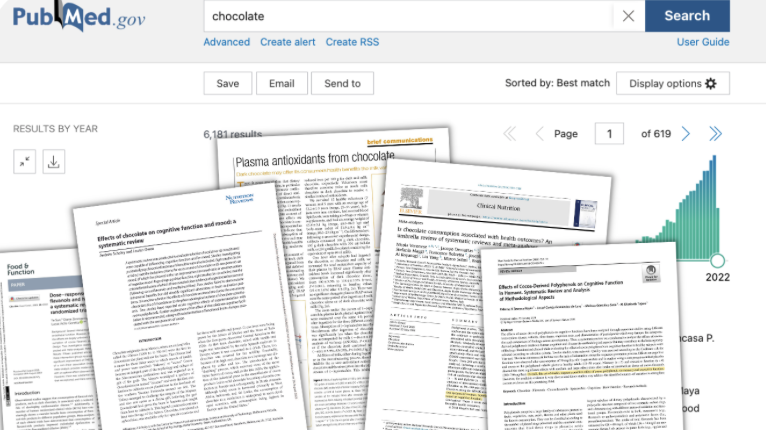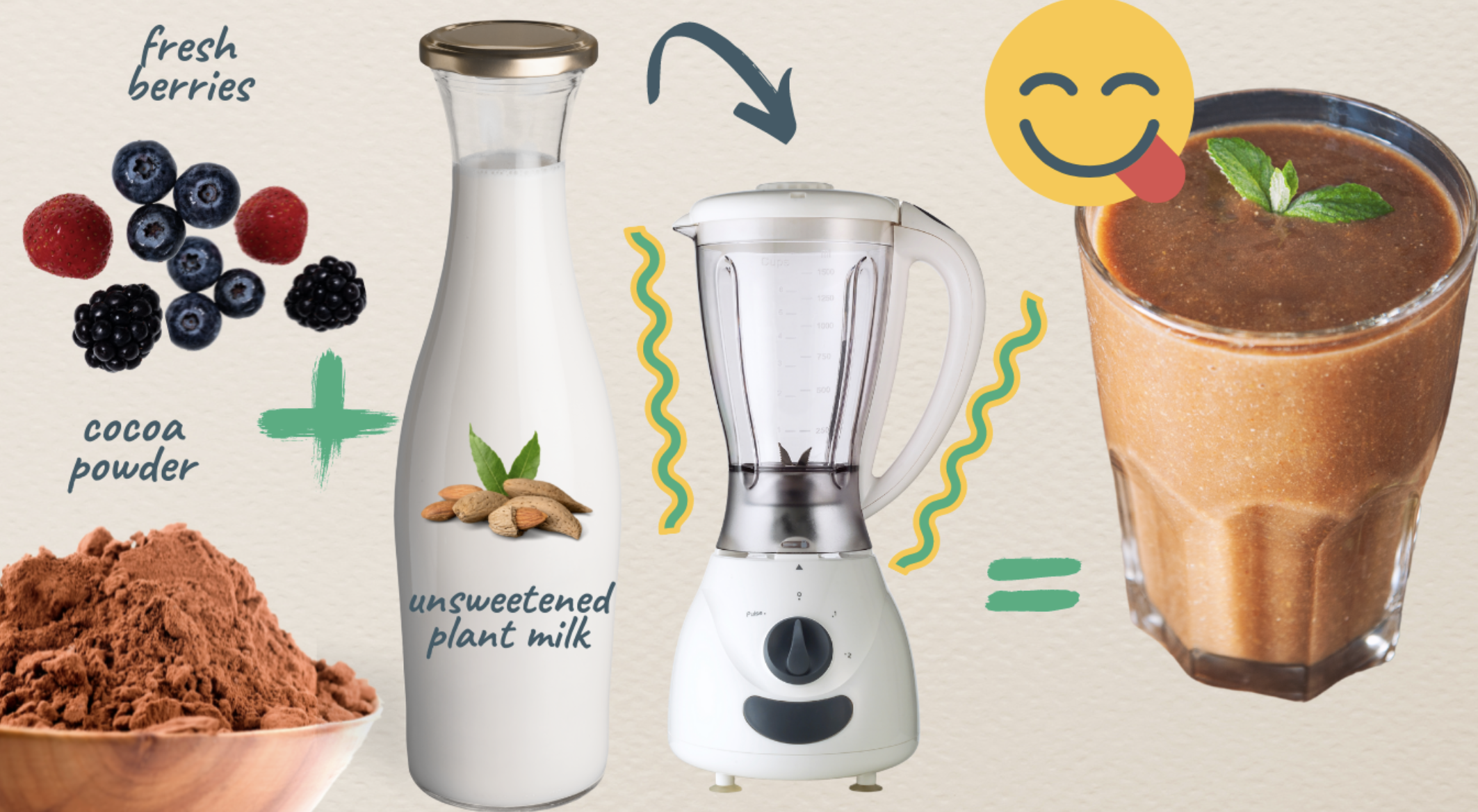Is Chocolate Healthy? What the Latest Science Says
Hi there, I’ve “bean” expecting you.
Globally, around 4 million tons of these beans are consumed every year (1). Today, I’m going to give you the lowdown on the latest science about this “Food of the Gods”. That’s right, we’re talking about chocolate!
The Mayans were probably the first to dig chocolate, and I mean REALLY dig it. They believed it was a gift from the gods, and I can understand why! Back then, their chocolate fix consisted of cacao beans prepared with hot water and chilli peppers. When the first Europeans encountered chocolate in the 16th century they were unsure about the “mysterious-looking almonds”. However, luckily for us, they figured that one out and chocolate began its triumphant and sweetened sweep throughout the world and…through our intestines, I guess.
It’s definitely delicious but just how healthy is it? Upon consulting my good old friend – the internet – about that particular question, I found out that chocolate has near-miraculous properties – even enhancing one’s maths skills (2). I really wish I’d known about this back in school. Are these magical medical properties too good to be true or actually based on scientific evidence, you’re asking? Now, that’s a great question. Let’s find out!
Image: World Diabetes Atlas, 2021
How much scientific research is there on chocolate and health?
As a matter of fact, there is a whole bunch of studies on chocolate (3). Many of them are either animal or in vitro studies or have very small sample sizes. Therefore, they are about as useful as a chocolate teapot. Additionally, we always should keep in mind how studies are funded as favourable outcomes are more likely with funding from the food industry. Let’s check instead the most recent evidence from systematic reviews and meta-analyses of larger human trials – both cohort and intervention studies.
Raw cacao beans – the origin of this chocolatey goodness – contain several important minerals such as magnesium, copper, potassium and iron (4). However, their medical properties most likely occur due to their extraordinarily high content of certain phytochemicals called polyphenols (5), specifically the flavanol epicatechin and its oligomers and polymers called proanthocyanidins (6).
The many associations between chocolate and human health
These plant compounds seem to play an important role in some human metabolic pathways through reducing oxidative stress (7). For example, they can ramp up nitric oxide levels causing improved endothelial function (8), reduced arterial stiffness (9) and enhanced blood flow (10). So, no wonder that the finding best supported by evidence is that regular chocolate consumption can reduce the risk of cardiovascular disease (11) including stroke, heart failure, myocardial infarction and coronary heart disease (12).
Furthermore, not only may chocolate and its polyphenols have positive effects on cardiovascular health but also on cardiometabolic health (13) potentially reducing dyslipidemia, insulin resistance, and systemic inflammation (13), which are all major subclinical risk factors for cardiometabolic diseases. In addition, regular chocolate consumption has been found to have favourable effects on BMI and body weight (14). These mechanisms make it feasible that chocolate consumption also confers reduced risks of type 2 diabetes (15).
You may have also heard about another association – chocolate and mood. A 2013 systematic review found that the data appear to demonstrate very reliable effects of chocolate and its components in attenuating negative mood (16). However, it might be noteworthy that Kraft Foods Inc. funded this review and a subsequent umbrella review of systematic reviews and meta-analyses found no association between chocolate consumption and better depressive mood or cognitive function (17).
God damn it! It’s all lies! What’s the point? Then again, a recent 2020 systematic review and meta-analysis about cocoa and cognition found a positive effect of cocoa polyphenols on memory and executive function (18). Another systematic review and meta-analysis in 2021 also found that the consumption of cocoa-rich products may improve affect and mood in the short term (19). Now, where did I put my chocolate?
Three things to keep in mind regarding evidence surrounding chocolate
Wait, what was I doing? … ah that’s right. OK – hold on. When looking at the evidence surrounding chocolate, we should keep three things in mind:
The quality of evidence for most of these findings is low to very low which means that, in order to “raise the bar” (get it?) much more thoroughly conducted research is needed, such as large-scale RCTs, to verify or falsify these findings.
Positive findings have only been found for dark chocolate and cocoa powder, not for white or milk chocolate (20, 21). There is inconclusive evidence on whether milk might interfere with flavonoid absorption and bioavailability. However, in most cases, milk chocolate contains negligible amounts of polyphenols (22) resulting in no considerable beneficial impact on health. Or as one study put it: the darker the better (23).
Last but not least: Chocolate contains quite a lot of calories. Luckily though, most of the positive effects we saw in the studies resulted from eating roundabout…hang on…only 10 to 30 g of dark chocolate a day? Ehm, so that’s already an additional 50 to 150 kcal. OK, so eating the amounts that I’ve been eating during this article probably poses more health threats than benefits. But don’t worry, I’ll let you know once there’s finally a study that says you can eat as much chocolate as you like. Come on researchers, work faster!
The future of chocolate research
As chocolate is such a well-loved food around the world, I’m sure we’ll continue to see ongoing research results and new meta-analyses for the foreseeable future. One of the most recent studies and meta-analyses I looked at for this article finds even more connections between chocolate consumption and lower risk of overall mortality (24). In addition, the authors observed
“significantly lower mortality from cardiovascular disease (CVD), heart disease and cancer, representing 13%, 16% and 12% risk reductions for the highest compared to lowest chocolate category, respectively” (24).
To get the best health benefits and a delicious treat, unprocessed cocoa powder – with no added sugar and packed with polyphenols – is the way to go. Let me show you how. Pour unsweetened plant-based milk of choice into a blender, add 20g of unprocessed cocoa goodness, throw in some lovely fresh berries, give it a quick blast to mix it all up then sit back and enjoy.
Additional Information:
-
Cirus Henn is an aspiring physician, nutrition expert and co-founder of the international medical nutrition organisation Physicians Association for Nutrition. For more than 15 years, he has studied nutrition in-depth as a means of enhancing well-being and performance as well as preventing and treating disease. In his lecturing and teaching activities, he inspires an international audience of medical professionals and interested lay people about the potential of healthy nutrition. His intensive examination of scientific findings and his deep-rooted interest in humanity guide his work.
-
https://www.iisd.org/system/files/publications/ssi-global-market-report-cocoa.pdf
https://www.ncbi.nlm.nih.gov/pmc/articles/PMC5465250/pdf/fimmu-08-00677.pdf
https://www.sciencedirect.com/science/article/pii/B9780128166871000096
https://www.tandfonline.com/doi/abs/10.1080/10408398.2020.1733484?journalCode=bfsn20




